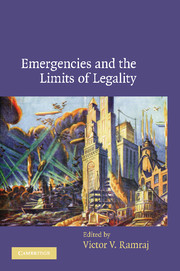Book contents
- Frontmatter
- Contents
- List of contributors
- Preface
- Introduction
- PART ONE Legality and extra-legality
- PART TWO Conceptual and normative theories
- PART THREE Political and sociological theories
- PART FOUR Prospective constraints on state power
- 9 Emergency strategies for prescriptive legal positivists: anti-terrorist law and legal theory
- 10 The ordinary law of emergencies and democratic derogation from rights
- 11 Presidentialism and emergency government
- PART FIVE Judicial responses to official disobedience
- PART SIX Post-colonial and international perspectives
- Index
- References
9 - Emergency strategies for prescriptive legal positivists: anti-terrorist law and legal theory
Published online by Cambridge University Press: 10 August 2009
- Frontmatter
- Contents
- List of contributors
- Preface
- Introduction
- PART ONE Legality and extra-legality
- PART TWO Conceptual and normative theories
- PART THREE Political and sociological theories
- PART FOUR Prospective constraints on state power
- 9 Emergency strategies for prescriptive legal positivists: anti-terrorist law and legal theory
- 10 The ordinary law of emergencies and democratic derogation from rights
- 11 Presidentialism and emergency government
- PART FIVE Judicial responses to official disobedience
- PART SIX Post-colonial and international perspectives
- Index
- References
Summary
The measures recently introduced in many jurisdictions in response to the perceived menace of terrorism have sparked controversies not only over civil rights and the limits of toleration, but also over the implications of these measures for legal theory and the relevance of legal theory to the evaluation of such responses to terrorist acts. How should we conceive emergency strategies in legal terms if they appear to abrogate law? What has legal theory to offer by way of principled support for, or criticism of, the rights-restricting policies commonly prompted by such horrendous events as 9/11, the London underground atrocity and the unending suicide bombing in Iraq and elsewhere?
While it cannot be assumed that what we are dealing with here is, as yet, so novel as to mark a distinctive new set of issues for political philosophy and legal theory, neither can it be assumed that we are not faced by a distinctive scenario that calls for radical and controversial measures that do not fit neatly in to our existing legal theories. Current forms of defending and promoting liberal democracy have been fundamentally shaped in a period marked by responses to genocidal and racist states, such as Nazi Germany and apartheid South Africa. These models may not be entirely suitable for dealing with the contemporary concerns about non-state terrorism, where the focus is on preventing freelance or loosely organised terrorism, as much as on the actions of abhorrent states.
- Type
- Chapter
- Information
- Emergencies and the Limits of Legality , pp. 201 - 228Publisher: Cambridge University PressPrint publication year: 2008
References
- 1
- Cited by



